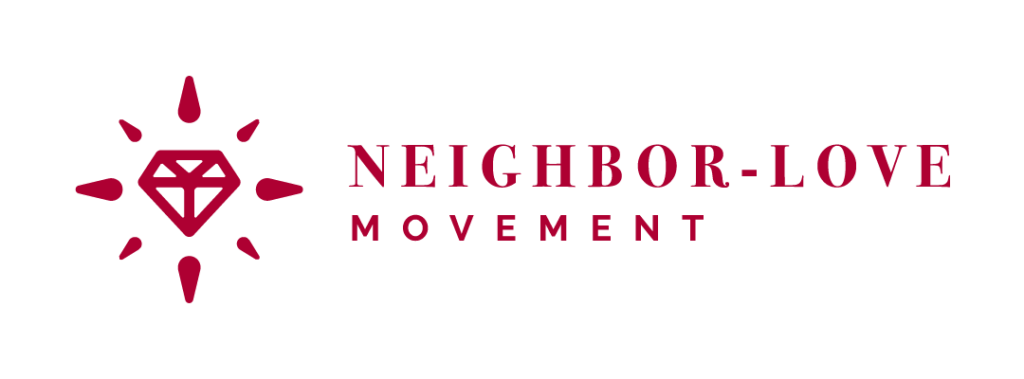Dear friends,
This week I’m sharing a letter from my heart to the beloved people of Ethiopia, but I think it will speak to readers around the world.
I have been receiving many hate messages and deaths threats in response to my work here, and this letter is written as a response to explain my mission. This letter is longer than my usual Stop & Think, so I thank you for your patience.
With deep gratitude for your love and support,
Andrew
Dear Ethiopia: My Unhidden Agenda
Suspicion of outsiders is common in Ethiopian culture. It exists in tension with Ethiopia’s celebrated tradition of hospitality.
This suspicion has deep historical roots.
For example, in the early 1600s, Jesuit missionaries briefly converted Ethiopia’s Orthodox ruler to Catholicism. In this moment, nationalism, religious zeal, and opposition to outsiders became woven together as one. Nation, religion, and independence interlocked. The then Ethiopia understood itself as a country under siege that needed to be protected against invaders.
Centuries later, colonialism’s Scramble for Africa understandably intensified this suspicion of outsiders. Ethiopia – and with it, Africans and freedom-fighters around the world – celebrated the defeat of the Italian colonizers – the “white man” – in 1896 at the Battle of Adwa and again in 1941 when Italy’s 5-year occupation was conquered. Ethiopia is a symbol of African autonomy. She boasts a “Victory Day” (Adwa) instead of an “Independence Day” like most other countries.
As global powers seek to exploit regional interests, natural resources, and cheap labor, it’s no surprise than many Ethiopians continue to feel a deep suspicion of outsiders. Unless you look and sound like a local – and increasingly even if you do – you may be perceived as a threat. Sadly, many of my Ethiopian friends are afraid to travel in their own country.
In light of this larger context, I can understand why many Ethiopians look at me with suspicion. Many Ethiopians simply can’t seem to believe that I love Ethiopia, that my wife and many of my best friends are Ethiopian, and that I feel grateful and responsible to be part of Ethiopia’s community.
I am repeatedly asked about my “hidden agenda” for being in Ethiopia. I am repeatedly accused of being a secret agent in the CIA or a member of “the Illuminati” or a Protestant missionary hellbent on destroying Ethiopia’s ancient traditions.
The truth is less exciting.
I’ve never met a member of the CIA or had any contact with the CIA. (I have met an FBI agent, and what they told me about their experience was very disappointing and saddening.)
I didn’t know anything about the so-called Illuminati until I read the Wikipedia page about it last night.
And I’m an inclusive Christian ethicist who loves and respects the Ethiopian Orthodox Tewahedo Church and Ethiopian Muslims. In fact, I have always challenged my non-Orthodox students to stop referring to Orthodox sisters and brothers as non-Christians. I require my students to study Orthodox books, meet with Orthodox teachers, and visit Orthodox pilgrimage sites, just like we study Islam and meet with Muslim teachers. My students can confirm this.
Another accusation I hear often is that I’m in Ethiopia to get rich. Again, the truth is less exciting.
I’ve never actually been paid a salary in Ethiopia, because I have always chosen to work for free, despite having a PhD from a top ten research university. I don’t own a business, car, house, land, or any other fixed asset – in Ethiopia or anywhere else. I don’t have health insurance or life insurance. I have a 15-year-old guitar and hundreds of books. Those are my prized possessions.
But this doesn’t satisfy many Ethiopians’ suspicion. They are certain that I have a “hidden agenda” for being in Ethiopia – some devilish mission to destroy the country.
Frankly, this has been painful and perplexing to me. People take an interest in the United States, they move there, and they become part of the community. My home church had Danish and Mexican pastors. Why? They loved living and working in the US. It was wonderful.
In fact, hundreds of thousands of Ethiopians have had the same experience in the United States. My home city Chicago has over ten thousand Ethiopians, an Ethiopian Cultural Center, numerous Ethiopian restaurants, and countless Ethiopian businesses and professionals. I think this is wonderful and normal. I’m grateful they’re part of the American community.
We live in an interconnected world where people fall in love with others and to choose to live in different places with different people. One of my dearest American friends lives in Germany. Another lives in Denmark. Another lives in Thailand. I could mention many others.
But because Ethiopia has a (resented) reputation of being a place of war, poverty, and hunger, many proud Ethiopians seem to find it unthinkable that an outsider would actually love Ethiopia and want to be part of Ethiopia. In their minds, the only “real” reason a foreigner could want to live and work in Ethiopia is political power, religious proselytizing, or financial profit.
I know many of you reading this won’t be convinced. But, again, my story is less – and far more – exciting. I’m not interested in power, proselytizing, and profit.
I came to Ethiopia for the first time in 2004 as a university student to do an internship. Many universities in the United States require students to do an internship in order to graduate. This is basically an unpaid time of focused learning and service in another context.
I did my internship in Addis at a place called The Mercy Center, which provided food support and vocational training for impoverished women and youth. I also had the privilege of teaching a course at a local college and traveling to Gondar and Lalibela. My Ethiopian host became an important mentor in my life.
Ethiopia profoundly energized and integrated my core passions: faith in God, love for people, rigorous study, and practical service. I fell in love with Ethiopia.
After my first few months in Ethiopia, my driving question wasn’t, “How can I change Ethiopia?” My driving question was, “How can I develop my relationship with Ethiopia and learn from Ethiopia about what it means to be human?” From my first flight to Ethiopia until today, my prayer has always been: “God, make me a learner and a servant.”
When I returned to my American university in August 2004, I wrote a seminar paper on Lalibela and how western churches should learn from Lalibela’s amazing architecture and spirituality. Ethiopia continued growing inside of my heart. Strangely, Chicago no longer felt completely like “home.” Something was missing. For example, there wasn’t any decent kwanta ferfer in Chicago.
Unsurprisingly, when I graduated with my BA (summa cum laude with Scholastic Honors), I decided to move back to Ethiopia. I arrived a few days before 193 people were murdered in the streets by police in November 2005. Everyone remembers this terrible time.
When we go through painful experiences with people like this, our hearts get bound together. I remember hearing the terrifying machine-gun fire. I listened to many people tell me stories about loved ones disappearing, going to jail, or being murdered. My heart was broken and bound together with my Ethiopian neighbors.
But my heart was also inspired. I experienced the incredible courage and resilience and passion for dignity and freedom in Ethiopian people. I learned a lot about endurance and sacrifice and hope. God, it’s amazing.
2005 (“Zetena Sebat”) marked me for life. It was one of the most formative moments in my development as a person, a Christian, and a citizen of the world. In many ways, my M.A. and PhD in Religious and Political Ethics came out of the way Ethiopia inspired and challenged me in that year. Hannah Arendt wrote about the burning of the Reichstag in 1933 as the time when she “became responsible.” 2005 is the time when I became responsible.
In 2006, I won a Presidential Fellowship at Harvard University. I’ll never forget getting the email in “Little Mogadishu” in Bole Mikael at a tiny Internet cafe in my neighborhood. Harvard told me they wanted to give me money and study my career for the rest of my life. No joke.
But my dream was to go to the University of Chicago, so I declined Harvard’s humbling offer and enrolled at the university, which boasts the world’s highest number of Nobel Prize winners. This is where I met Professor Donald Levine and did one-on-one courses – intense courses! – on Ethiopian Studies with him. This is where I got mentored by Professor Elshtain and Professor Schweiker and other world-famous thinkers.
UChicago was incredible. But – surprise, surprise – I loved and missed Ethiopia the entire year. Chicago was no longer fully home.
So I did something crazy: I dropped out after finishing my first year. After doing a philosophy seminar at the University of Paris in June 2007, I moved directly back to Addis.
That year profoundly changed my life. I fell in love with my future wife. I met many of my dearest friends. We’ve shared weddings and funerals and work and other life-defining events filled with too much laughter and tears to describe.
I got mugged for the first time by three men on a dark street in Yerer. I had a major injury in Bole due to typhoid fever from drinking tap water. I learned profound and painful leadership lessons.
I traveled across Ethiopia like never before and was totally amazed by the beauty and richness and welcome of Ethiopia’s diverse peoples and landscapes.
Ethiopia had become part of me – part of my love, part of my story, part of my deepest memories and hopes. I had given my heart to Ethiopian people, and they were giving their hearts to me.
“Home” was no longer one place. Slowly I discovered that I had two homes and two families. (If you haven’t experienced this, it’s incredibly confusing and beautiful and painful and humanizing.)
But I’ve said all of this to reveal to you my unhidden agenda for living and working in Ethiopia today, so I have to skip several years of my story.
On May 1, 2010, I met a young boy named Eyob who begged me to help him. Eyob had a wound on his head so terrible that I could literally see his brain pulsing beneath his bleeding flesh. I have never seen a wound so horrifying and heartbreaking.
![]()
Eyob changed my life forever. He gave me my mission. I carried Eyob’s picture over my heart when I graduated with my PhD in 2015. I dedicated my first book to Eyob in 2018. I keep Eyob’s picture on my desk to this day.
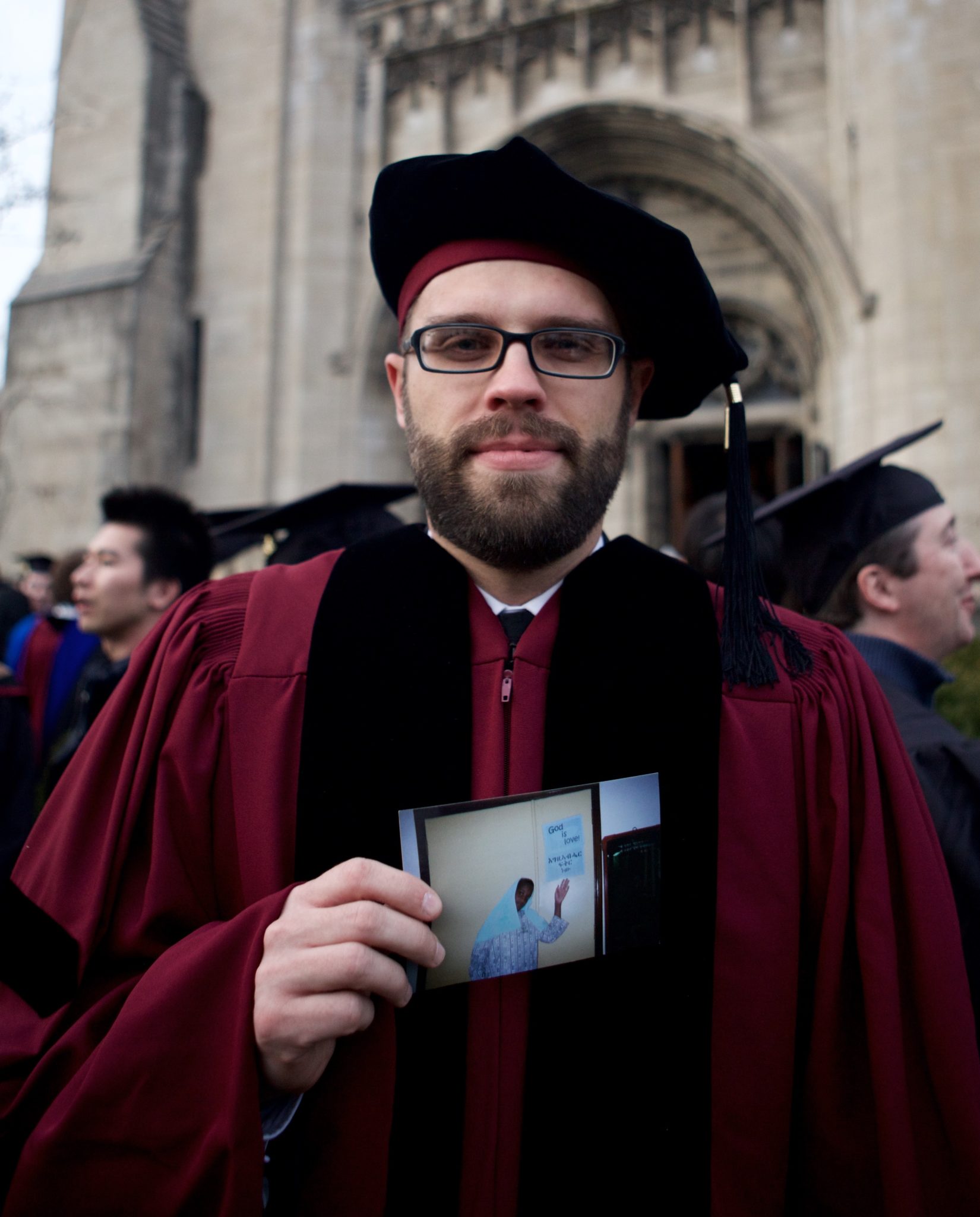
As I fought for Eyob’s life at the Korean Hospital for several months, I discovered that he was full of love and hope and courage and kindness and generosity. This kid with the most heart-shattering wound was like an old man full of wisdom, strength, and vision.
His dream was to become a pastor and professor who would inspire others to not lose hope and to care for suffering people like himself.
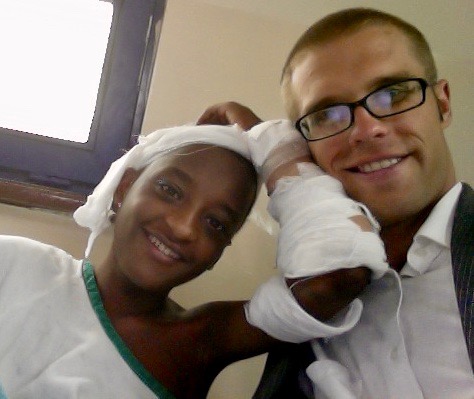
Eyob showed me the best of Ethiopia – the resilience, the faith, the kindness, the generosity, the love. I call him my personal “saint of darkness.”
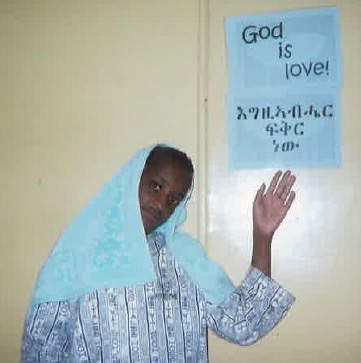
But Eyob also showed me the worst of Ethiopia. This boy fell into a cooking fire as a baby, and no one ever helped him. Eyob’s life was a story of ever-increasing suffering and stigma. By the time I met him, he was wandering Addis all by himself in excruciating pain.
No one saw Eyob. No one helped him. Apparently no one valued Eyob – at least not enough to do something. In the Hospital, I heard “Christian” medical professionals curse Eyob and tell him he belonged in the streets like a dog.
This enraged me and clarified my deepest conviction: suffering people are valuable.
Despite our best efforts and many surgeries, Eyob died a few months later. It was too late; we couldn’t save him. When I heard this news, I fell to my knees and wept uncontrollably.
Why did Eyob die?
Eyob died because nobody saw him as a neighbor – as a person with precious value. Blindness killed Eyob. This amazing boy was a brilliant diamond, but nobody saw him that way. They just saw his horrific wound and left him to die like a dog in the street.
Imagine if Eyob were alive today. He would be well on his way to being a life-changing pastor and professor. He would be opening our eyes to suffering and also inspiring us with hope. He would be enriching Ethiopia.
And that’s my mission. That’s the mission Eyob gave me.
I live and work to help people see others as precious diamonds. My passion is to help us open our eyes, so people like Eyob can be seen as neighbors and given a fair chance to survive, grow, and fulfill their God-given destiny.
This is why Balinjeraye: The Neighbor-Love Movement has a diamond as our logo. People are diamonds. People are precious. They’re not less or unrelated to us. They’re our neighbors. They’re connected to us, part of us.
And this is why we have a compass around the diamond in our logo. When we see people as diamonds, we have the direction we need to live. We know where to go and what to do. We have our map for life.
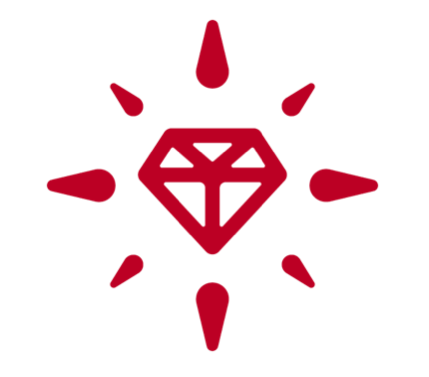
Eyob gave me my mission, my agenda, my calling in Ethiopia, in America, in the world, in my own skin. I want to live for the neighbor-love movement this Ethiopian boy taught me with his painful and beautiful life.
And neighbor-love isn’t just fuzzy feelings and happy thoughts. It’s passionate will and practical work for others’ wellbeing. Sometimes neighbor-love is really inspiring and joyful. Sometimes it’s really painful and hard.
If you follow my work, you’ll see that I tell inspiring stories and celebrate the amazing goodness in Ethiopia. But I also name injustice and challenge evil in Ethiopia.
Why?
Because I don’t want our Eyobs to keep suffering and dying.
Because I hate it when life is cheapened and destroyed.
Because I love Ethiopia, and Ethiopia can only flourish when her Eyobs are alive and seen and protected and provided for and empowered – not buried in the ground like Eyob.
So I celebrate Ethiopia, and I criticize Ethiopia – just like I celebrate and criticize America. No place is perfect, but every place is precious. Every place has problems. I have problems; I write about them openly.
So what’s my “(un)hidden agenda”?
It’s not the CIA. It’s not the Illuminati. It’s not destroying the Orthodox Church. It’s not converting Muslims. It’s not making money.
It’s Eyob.
It’s learning to see and treat others as precious neighbors.
We only live once, and our lives are short and fragile. Eyob died way too young.
I’ve decided to make Eyob’s mission my mission. I’ve decided to give my life for his. I want to inspire hope for suffering people. Sometimes that looks like joy-filled stories of beauty. Other times that looks like addressing the nasty injustices that make our Eyobs suffer and die.
We can’t have one without the other. How can I claim to love my neighbor if I don’t challenge the blindness, hatred, and injustice that make him suffer? I can’t. Celebration and critique are neighbors.
So, dear Ethiopian friends, I live and work in Ethiopia because I love Ethiopia and I feel responsible to do what I can to be part of the community – a community I consider home, family, beloved.
Many of you don’t want me here. I understand that. Foreigners have done a lot of good in Ethiopia, but they’ve also done a lot of harm. Some foreigners are incredibly ignorant of Ethiopia and incredibly arrogant toward Ethiopians. This embarrasses me and makes me sick. Many foreigners exploit Ethiopia for money and power. It’s ugly and wrong. I hate it when I go to a restaurant and the server gives me a chair but makes my Ethiopian friends seat themselves.
Moreover, we live in a time of rising prejudice and racism. Many Americans don’t like foreigners and want them to “get out.” This embarrasses me and makes me sick. This is why I participated in a protest in Chicago against policy brutality. This is why I boldly and tirelessly oppose Donald Trump. Racism is spreading around the world, including in Ethiopia.
I don’t have a hidden agenda, but I do have a mission. My mission is to inspire people to see others as precious neighbors and thus to will and work for their wellbeing. The whole world needs this vision. America needs this vision. It’s nothing new. It’s ancient. It’s part of Ethiopia’s rich cultures. Moses, Jesus, Mohammad, Estifanos, King – they all saw it.
But it needs renewal and expansion today, and that’s what I’ve given my life to.
Before concluding this letter, I want to share something with you.
I get countless hate messages from Ethiopian people. I’m receiving an increasing number of death threats. Most of them come from people who claim to be religious. Some of them are extremely disturbing.
If I get killed in Ethiopia, I’m ready for that. I’m sure that killing me would make someone feel patriotic or religious – like they have an important “identity.” I don’t have a martyr complex. I want to live a long and peaceful life just like everyone else.
But we’re all going to die, and I want to live for something larger than myself. If living for love, justice, and flourishing is threatening to some people, that’s not in my control.
But I won’t stop. To stop would be to die before I’m dead, and that is spiritual suicide.
Caleb Meakins won’t let me stop.
The guy I saw getting stoned in the street yesterday won’t let me stop.
You can curse me; I will bless you.
You can threaten me; I won’t threaten back.
I believe in language and nonviolence. I hate insults, violence, and human suffering. And insults and violence only produce human suffering. They produce what killed Eyob.
You can kill me. Many people are getting murdered in Ethiopia today, just like many people are getting murdered in the US and other countries. That’s an atrocious evil, but it happens everyday. What makes me special? Nothing. I witnessed a man nearly get stoned to death in the street yesterday in my neighborhood, and no one did anything. Perhaps I’m next.
But for the time I have, I’m going to chase my mission. And that’s to lift up the value of human life and to critique what destroys it. I do that through teaching, writing, and mentorship. Mainly, I do it through friendship. I fiercely critique injustice and evil, as best as I’m able to see it. But I’m peace-loving and gentle. I get no pleasure out of conflict.
One last word.
We’re one, but we’re not the same. I believe religious authorities should be questioned and held accountable when they mislead and harm others – Muslim, Pentecostal, Orthodox, Jewish, whomever. I know many people find this culturally unacceptable.
I believe in human equality and think that hierarchical relationships have limited value. I know many people find this culturally unacceptable.
I oppose nationalisms of all kinds. I know many people find this culturally unacceptable.
I believe leadership should be as inclusive and mutual as possible; I oppose authoritarian and dictatorial styles of leadership. I know many people find this culturally unacceptable.
This is what I believe and who I am. We don’t need to be the same. We can ask each other questions, have conversation, challenge one another, and refuse to curse each other when we disagree. Sometimes I’ll fit in; sometimes I won’t. That’s normal. Everyone everywhere experiences this, including Ethiopians in Ethiopia.
As I said at the beginning of this letter, Ethiopia is celebrated for her tradition of hospitality. And I want to say thank you for welcoming me – back in 2004 and still to this day.
My wife, my best friends, my second family, my second home, many of my most important memories and experiences are rooted here. I can’t change that. I don’t want to change that. As you might say, part of my umbilical cord is buried in your soil.
I bless Ethiopia and all of her ethnic families. I celebrate a diverse and multi-ethnic Ethiopia.
I bless the Orthodox. I bless the Muslims. I bless the Pentes. I bless the Waaqefeetaa. I celebrate a diverse and multi-religious Ethiopia.
I bless the rich and poor, the sick and healthy, the welcoming and rejecting.
I bless Prime Minister Abiy Amhed. I bless my brother Jawar Mohammed. I bless my brother Eskinder Nega. I bless my brother Desalegn Chanie. I celebrate a democratic Ethiopia.
I condemn hatred, injustice, and violence – starting in myself.
I commit to practicing neighbor-love as best I can – passionately and imperfectly – with my eyes, my ears, my voice, my hands, my heart, my feet, my mind.
So, dear Ethiopia, thanks for enriching my life. You’re dear to me. We don’t always agree. We don’t always like each other. But that’s normal for family. Love is deeper. I love you.
I’m grateful for the years, and hope there will be many more. God knows; I’ve counted the cost.
As Dr. Martin Luther King said, “The end of life is not to be happy nor to achieve pleasure and avoid pain but to do the will of God, come what may.”
Yours,
Andrew/Enderias/Idris
PS: If you want to join Balinjeraye, I invite you to sign our Covenant, embody our Practices, and become an Ambassador of Neighbor-Love: www.balinjeraye.org/sign



